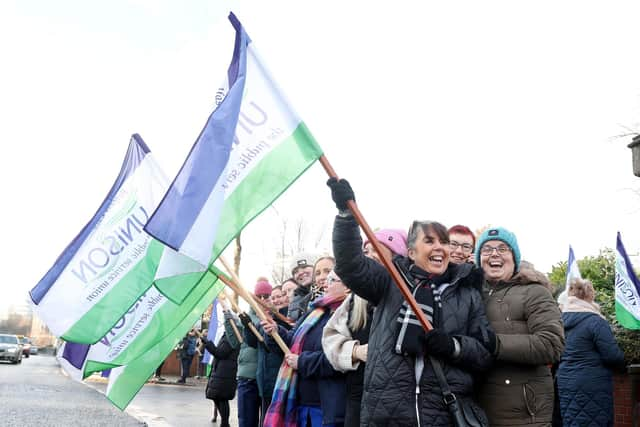Unions considering 'continuous' strike action in Northern Ireland health service until talks begin
and live on Freeview channel 276
Dates for full strike action were under active consideration on Tuesday evening.
A member of Unison's strike committee told the News Letter the dispute could escalate to "continuous" strike action – without a set end date – unless negotiations on pay take place.
Advertisement
Hide AdAdvertisement
Hide AdThis comes as a leading health chief urges the UK government at Westminster to reopen talks with unions over pay, saying the “last thing” the NHS needs is further strike action this month.


The Royal College of Nursing (RCN), meanwhile, has announced strike dates of January 18 and 19 for certain areas of England. No dates have yet been announced by the trade union for Northern Ireland but the RCN's dispute remains active here and further strikes are considered likely without some form of breakthrough in the national dispute.
Stephanie Greenwood, chair for Unison in the Northern health Trust and a member of the union's strike committee in Northern Ireland, said: "Action short of strike will begin again on the 16th and continue until the 29th. In terms of a full strike or full strikes, those decisions are taken by a regional strike committee that is due to meet again shortly for final decisions on dates."
She confirmed that "continuous and accelerated industrial action" will be under consideration,
Advertisement
Hide AdAdvertisement
Hide AdAsked to clarify, she said: "Continuous strike action means action until we get somebody to negotiate with us in terms of a decent pay offer for the members of the health service that we represent.
"It will go on and it will escalate until somebody sits down in a room and enters into negotiations, and when I say 'somebody' I mean either the Executive taking their seats at Stormont or nationally negotiations begin."
Senior Nipsa official Padraig Mulholland, also speaking to the News Letter on Tuesday, said: “Nipsa and Unison are co-ordinating their action to ensure the maximum impact whilst still ensuring the safety of patients. We are caling for the other trade unions in the health service to co-ordinate with us as well.”
This all comes amid intense pressure on the health service in Northern Ireland, with serious difficulties also being faced elsewhere in the UK.
Advertisement
Hide AdAdvertisement
Hide AdThe vice president of the Royal College of Emergency Medicine in Northern Ireland, Dr Paul Kerr, told the BBC: "We have a dreadful crowding situation and we have perhaps 450 patients lying on trolleys at this moment in time, queuing literally to get into hospital for emergency treatment."
Matthew Taylor, chief executive of the NHS Confederation, which represents NHS organisations across the UK, said the current situation in the health service is “very difficult” as it grapples with too few staff and high demand exacerbated by flu and Covid.
Mr Taylor, also speaking to the BBC, said: “There’s no doubt the situation is very difficult – that’s why many trusts have declared critical incidents.
“We are not able to provide the level of service we want to provide…
Advertisement
Hide AdAdvertisement
Hide Ad“The simple reality here is that the health service is caught between the fact that it has limited capacity, particularly when it comes to workforce – 130,000 vacancies – and a level of demand that it is difficult to meet in ordinary times.
“When you add in flu and Covid, which doesn’t just affect patients but also means many staff are off ill, that’s when you get to this very difficult situation we’re in.”
Asked if cases of flu and Covid have peaked, he said: “I think it’s very difficult to be clear. I don’t think the statistics would give us reason to feel that we have peaked – January is normally the hardest month for the health service.
“But also… it’s really important that, as ministers return to their desks, that they consider ways of reopening negotiations with the trade unions because four days of strikes on top of the situation we’re in now is the last thing we need.”
Advertisement
Hide AdAdvertisement
Hide AdStephanie Greenwood, meanwhile, said: "The trade union position is that we don't feel we are damaging the health service by taking industrial action. We see this as a last resort by our members. What we feel is that the health service is being damaged every single day. At one of my hospitals, at the Causeway in Coleraine, ambulances were queued outside of it last week with patients being treated outside - not on a day of industrial action, not on a day of strike action, on a normal functioning day. It is not the striking workers who are causing damage to the NHS - it is years and years of underfunding, it is years and years of poor staff planning and reform.
"The core fundamental to fix this is to give NHS workers a decent pay rise and to make major reforms to community care."